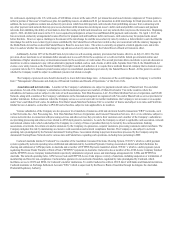First Data 2013 Annual Report Download - page 21
Download and view the complete annual report
Please find page 21 of the 2013 First Data annual report below. You can navigate through the pages in the report by either clicking on the pages listed below, or by using the keyword search tool below to find specific information within the annual report.
The Company is the subject of various legal proceedings which could have a material adverse effect on the Company’s revenue and profitability.
The Company is involved in various litigation matters. The Company is also involved in or is the subject of governmental or regulatory agency
inquiries or investigations and makes voluntary self disclosures to government or regulatory agencies from time to time. If the Company is unsuccessful in its
defense in the litigation matters, or any other legal proceeding, it may be forced to pay damages or fines, enter into consent decrees and/or change its business
practices, any of which could have a material adverse effect on the Company’s revenue and profitability.
The ability to recruit, retain and develop qualified personnel is critical to the Company’s success and growth.
All of the Company’s businesses function at the intersection of rapidly changing technological, social, economic and regulatory developments that
requires a wide ranging set of expertise and intellectual capital. For the Company to successfully compete and grow, it must retain, recruit and develop the
necessary personnel who can provide the needed expertise across the entire spectrum of its intellectual capital needs. In addition, the Company must develop its
personnel to provide succession plans capable of maintaining continuity in the midst of the inevitable unpredictability of human capital. However, the market
for qualified personnel is competitive and the Company may not succeed in recruiting additional personnel or may fail to effectively replace current personnel
who depart with qualified or effective successors. The Company’s effort to retain and develop personnel may also result in significant additional expenses,
which could adversely affect the Company’s profitability. The Company cannot assure that key personnel, including executive officers, will continue to be
employed or that it will be able to attract and retain qualified personnel in the future. Failure to retain or attract key personnel could have a material adverse
effect on the Company.
Failure to comply with state and federal antitrust requirements could adversely affect the Company’s business.
Through the Company’s merchant alliances, it holds an ownership interest in several competing merchant acquiring businesses while serving as the
electronic processor for those businesses. In order to satisfy state and federal antitrust requirements, the Company actively maintains an antitrust compliance
program. Notwithstanding the Company’s compliance program, it is possible that perceived or actual violation of state or federal antitrust requirements could
give rise to regulatory enforcement investigations or actions. Regulatory scrutiny of, or regulatory enforcement action in connection with, compliance with state
and federal antitrust requirements could have a material adverse effect on the Company’s reputation and business.
Unfavorable resolution of tax contingencies could adversely affect the Company’s tax expense.
The Company’s tax returns and positions are subject to review and audit by federal, state, local and international taxing authorities. An unfavorable
outcome to a tax audit could result in higher tax expense, thereby negatively impacting the Company’s results of operations. The Company has established
contingency reserves for material, known tax exposures relating to deductions, transactions and other matters involving some uncertainty as to the proper tax
treatment of the item. These reserves reflect what the Company believes to be reasonable assumptions as to the likely final resolution of each issue if raised by
a taxing authority. While the Company believes that the reserves are adequate to cover reasonably expected tax risks, there is no assurance that, in all
instances, an issue raised by a tax authority will be finally resolved at a financial cost not in excess of any related reserve. An unfavorable resolution,
therefore, could negatively impact the Company’s effective tax rate, financial position, results of operations and cash flows in the current and/or future
periods.
The periodic reporting requirements of the SEC will automatically terminate after the end of the year if the Company continues to have less than
300 shareholders. The Company may continue filing with the SEC as a voluntary filer but the information provided in the Company’s periodic
reports will be subject to limited regulatory oversight which may adversely impact the Company’s ability to provide accurate and complete financial
reports. In addition, the Company could discontinue filing with the SEC.
The Company’s periodic reporting responsibilities with the SEC will automatically terminate in the event that it has less than 300 shareholders after the
end of any year. The Company currently has 1 shareholder. Even if the Company would later file a registration statement that is declared effective during a
year and it once again becomes subject to the periodic reporting requirements of the SEC, any of the Company’s periodic reporting responsibilities will
automatically terminate in the event that it has less than 300 shareholders after the year in which any registration statement that the Company files with the
SEC becomes effective. The Company will still be required to provide certain information, including financial information, about it to holders of the
Company’s indebtedness pursuant to the agreements governing such indebtedness but could discontinue filing periodic reports with the SEC or continue as a
voluntary filer with the SEC. If the Company discontinued filing with the SEC or continued as a voluntary filer, the Company’s periodic reports will be
subject to less oversight and regulatory scrutiny than those subject to the periodic reporting requirements of the SEC which may adversely impact the
Company’s ability to provide accurate and complete financial reports.
20
























